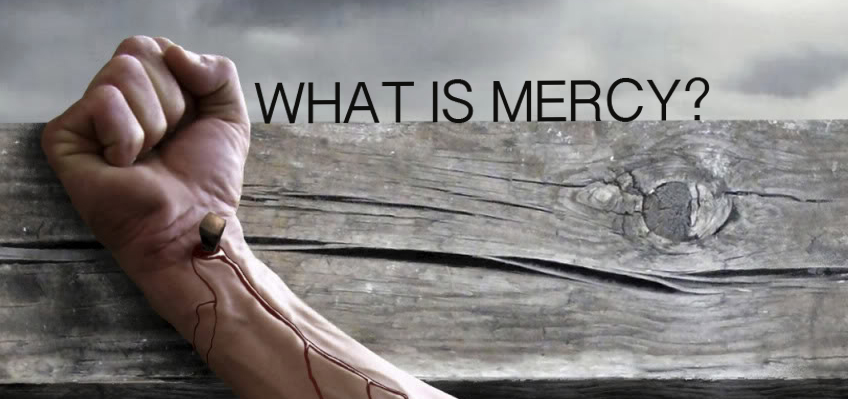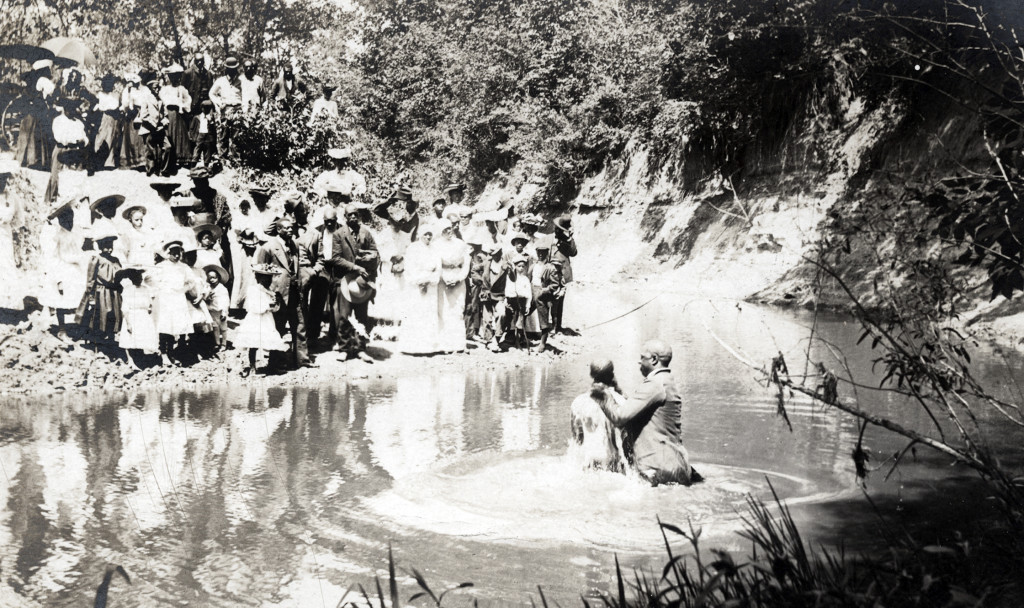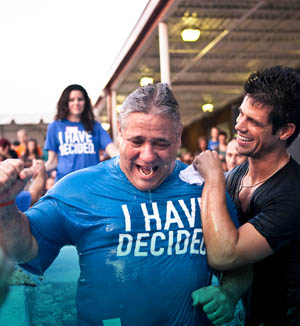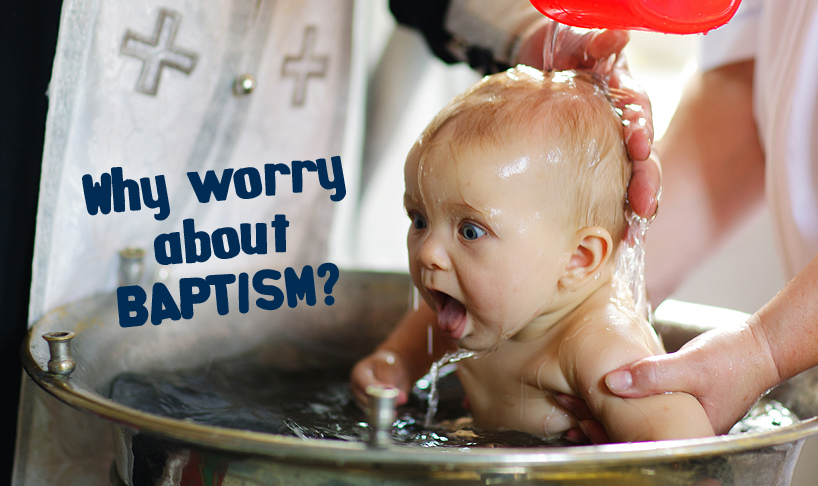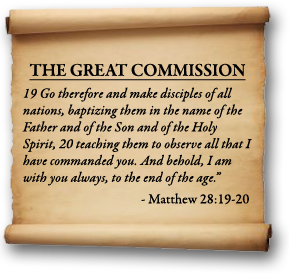Trump does not get the Gospel
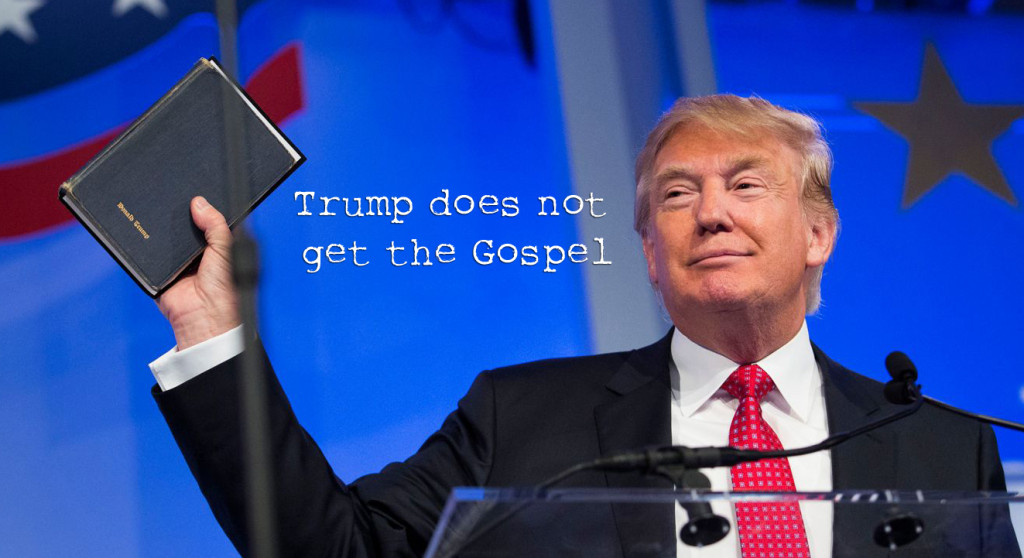
Recently the Pope made a statement that implied that Donald Trump was not a Christian. He pointed to Trump’s plan to build a wall between the US and Mexico and said “A person who thinks only about building walls, wherever they may be, and not building bridges, is not Christian. This is not in the gospel. As far as what you said about whether I would advise to vote or not to vote, I am not going to get involved in that. I say only that this man is not Christian if he has said things like that.”
Trump responded with this statement: “For a religious leader to question a person’s faith is disgraceful. I am proud to be a Christian… No leader, especially a religious leader, should have the right to question another man’s religion or faith.”
Firstly, I want to say that Trump is completely wrong in regard to the right of a religious leader to question another man’s religion. In fact, the apostle Paul would say that that is one of the responsibilities of a religious leader. Consider Paul’s instruction to his trainee-minister, Titus: “[An elder] must hold firmly to the trustworthy message as it has been taught, so that he can encourage others by sound doctrine and refute those who oppose it. For there are many rebellious people, full of meaningless talk and deception, especially those of the circumcision group. They must be silenced, because they are disrupting whole households by teaching things they ought not to teach—and that for the sake of dishonest gain.” (Titus 1:9-11) Paul even models this in his public rebuke of Peter which he mentions in Galatians 2:11-14, when Peter was clearly “not acting in line with the truth of the gospel”.
Jesus himself also warns us to watch out both for false believers and for the fact that we might be a false believer ourselves. In Matthew 7:13-23 Jesus says:
“Enter through the narrow gate. For wide is the gate and broad is the road that leads to destruction, and many enter through it. But small is the gate and narrow the road that leads to life, and only a few find it. Watch out for false prophets. They come to you in sheep’s clothing, but inwardly they are ferocious wolves. By their fruit you will recognize them. Do people pick grapes from thornbushes, or figs from thistles? Likewise, every good tree bears good fruit, but a bad tree bears bad fruit. A good tree cannot bear bad fruit, and a bad tree cannot bear good fruit. Every tree that does not bear good fruit is cut down and thrown into the fire. Thus, by their fruit you will recognize them. Not everyone who says to me, ‘Lord, Lord,’ will enter the kingdom of heaven, but only the one who does the will of my Father who is in heaven. Many will say to me on that day, ‘Lord, Lord, did we not prophesy in your name and in your name drive out demons and in your name perform many miracles?’ Then I will tell them plainly, ‘I never knew you. Away from me, you evildoers!’”
Now, we have to be careful not be too quick to judge someone as a false believer. Jesus even warns his followers to have this caution in Mark 9:38-41. But in order for us to clearly proclaim and protect the gospel message, we need to be able to call a spade a spade. When someone has no understanding of the Christian gospel or shows no fruit that should accompany someone who claims to be a Christian (see Galatians 5:16-23), then we should feel free to suggest that that person is not a Christian.
Now, there may be many, many reasons for someone to consider that Donald Trump is not a genuine Christian. You could point to his unrepentant boasting about his various extramarital affairs, or his sexist, racist and ableist comments, or his foul language, or his commitment to bring back the practise of water-boarding and worse, or his threats of violence against those that oppose him, or his general arrogance and ego. These examples show that the fruit of a life shaped by the Spirit of God – namely love, joy, peace, forbearance, kindness, goodness, faithfulness, gentleness and self-control – are severely lacking in Trump, and might be considered enough to conclude that he wasn’t actually a Christ-follower. As Jesus said, “By their fruit you will recognize them.” (Matthew 7:20).
Now, you have to be careful judging the reality of someone’s conversion based on the fruit you see. We are all flawed works-in-progress. Someone may be a genuine follower of Christ and still have a lot of bad fruit that God is working on over time. The example I mentioned before where Paul publicly rebuked Peter (Galatians 2:11-14) was an example of one Christian rebuking another Christian. Paul accused Peter of “not acting in line with the truth of the gospel”. The problem with Trump though is not that he isn’t acting in line with the gospel, it’s that he doesn’t even know the gospel in the first place.
TWO CRITERIA TO BE A CHRISTIANÂ
When Jesus called people to follow him right at the beginning of his ministry he said, “The time has come. The kingdom of God has come near. Repent and believe the gospel!†In order to be a Christian (a Christ-person) Jesus commands two things: “Repent” and “believe the gospel”. This message is echoed later in Jesus ministry when he explains what the heart of his message is: “It is not the healthy who need a doctor, but the sick. I have not come to call the righteous, but sinners to repentance.” (Luke 5:31-32) and after Jesus was resurrected this call to “repent and believe” was carried on by his followers, as can be seen in Acts 20:21, “I have declared to both Jews and Greeks that they must turn to God in repentance and have faith in our Lord Jesus.”
Turning to God in repentance for our sin and believing in the good news about Jesus for our forgiveness is the simple requirement for the salvation that God offers. If you have not done this, then you are not a Christian and you can not claim that name. If you do not show evidence of having done this, then other people are right to (as Trump puts it) question your faith and religion.
The gospel message is the thing God uses to bring people into his kingdom. As Paul writes in Romans 1:16, “the gospel…is the power of God that brings salvation to everyone who believes”. Because of this, it is important that we are clear about the gospel, it is important that we defend the gospel and it is important that we protect the gospel from being corrupted over time. One of the ways to do this is to not be afraid to call someone out for not having the right to call themselves a Christian – either due to their lack of “repenting and believing” or due to their lack of the fruit that should accompany it.
As I mentioned about, it is easy to see that Trump is lacking in the fruit, but I think the thing that makes it even clearer that he is not a Christian, is the fact that he has not “repented and believed”. This video clip makes that abundantly clear.
Trump is asked the most basic of questions that a Christian should be able to answer without hesitation: “Have you ever asked God for forgiveness?”
Trump first tries to avoid the question, talking non-stop for a full minute trying to win the crowd by name-dropping his minister. When he is forced to confront the question he stumbles over his answer saying: “I’m not sure I have. I just go on and try to do a better job from there. I don’t think so. I think if I do something wrong I just try and make it right. I don’t bring God into that picture. I don’t… I don’t think in terms of that. I think in terms of let’s go on and let’s make it right.”
Not long after this interview, Trump was questioned about his answer and his understanding of Christianity on CNN.
Interviewer Anderson Cooper asked Trump: “The idea of repentance. Is that something that’s important to you?”
Trump answered: “I think repenting is terrific.”
Cooper: “But do you feel a need to? As part of forgiveness.”
Trump: “If I make a mistake then yeah, then I think it’s great, but I try not to make mistakes. I mean, why do I have to, you know, repent? Why do I have to ask for forgiveness if you’re not making mistakes? I work hard. I’m an honorable person. I have thousands of people who work for me. I’ve employed tens of thousands of people over the years.”
Cooper: “You give millions to charity.”
Trump: “I give millions. I built the Vietnam Memorial in Lower Manhattan, with a small group of people!”
JESUS CAME FOR THE SICK
As has been often pointed out by Christian commentators, if you do not see the bad news of our sin and need for forgiveness, then you will never see the good news of Jesus’ offer to die for your sin and provide you that forgiveness. It’s like chemo. You’ll never go do it if you don’t realise you have cancer.
In Luke 5:30-32, the Pharisees ask Jesus, “Why do you eat and drink with tax collectors and sinners?” Jesus answers, “It is not the healthy who need a doctor, but the sick. I have not come to call the righteous, but sinners to repentance.” Jesus describes himself as a doctor, and if you don’t know you’re sick, you won’t go to him. Jesus has come for sinners, not those who think they are “righteous”.
Trump falls into the exact same problem the Pharisees did in Jesus’ day. When asked about whether he has asked God for forgiveness, Trump says “I don’t think so”. When asked about what he thinks about repentance, Trump says “Why do I have to repent?”. Trump does acknowledge that he may have made some mistakes, but that doesn’t drive him to his needs before God. In fact he says, “If I do something wrong I just try and make it right. I don’t bring God into that picture.”
In his mind, Trump is his own saviour. And if asked about whether he feels a need to repent, he will point out all his good works – working hard, being honorable, employing people, giving to charity and building stuff. I don’t know about you, but that reminds me of a parable Jesus once told that seems quite appropriate. It’s found in Luke 18:9-14. Have a read and see who the Pharisee in the parable sounds like.
To some who were confident of their own righteousness and looked down on everyone else, Jesus told this parable:
“Two men went up to the temple to pray, one a Pharisee and the other a tax collector. The Pharisee stood by himself and prayed: ‘God, I thank you that I am not like other people—robbers, evildoers, adulterers—or even like this tax collector. I fast twice a week and give a tenth of all I get.’
“But the tax collector stood at a distance. He would not even look up to heaven, but beat his breast and said, ‘God, have mercy on me, a sinner.’
“I tell you that this man, rather than the other, went home justified before God. For all those who exalt themselves will be humbled, and those who humble themselves will be exalted.â€
WE ARE LIKE TRUMP
Now, this article may sound like I am just having fun dumping on Trump. That’s actually not my goal at all. In fact it would be hypocritical for me to quote the parable above and then just say, “God, I thank you that I am not like Donald Trump!” The fact is that although Trump needs forgiveness and needs to repent, we are no better than him. The point of the parable that Jesus told was that we should not base our understanding of our own goodness by comparing ourselves to others. We should be like the Tax Collector. The Tax Collector was actually a worse sinner than the Pharisee, but he did something that meant that he went home right with God – he acknowledged his sin and he asked for mercy. In Jesus’ words, he “humbled” himself before God. That is something we all need to do, and if you are standing next to Trump on the day of Judgment, you can’t point to him and say, “At least I was better than him.” No. We are like Trump. We all need forgiveness. We all need to repent. We all need Jesus. We are all in the same boat.
My aim in writing this article is not to get you to hate Trump. It’s not to get my American friends to not vote for him (though most of them are more anti-Trump than I am). My aim in writing this is twofold. Firstly, in order to defend the integrity of the true Christian gospel I feel it is important to say that Trump does not get it. It is important that I point to an example like Trump and say, despite the fact that he calls himself a Christian, he is not one. There is only one gospel. And as R.C. Sproul said at the Ligonier National Conference just yesterday, “Whatever else we do with the gospel, we must never, ever, ever mess with it.”
But secondly, we must make sure that we do not fall into the same trap. We must make sure that we understand the gospel clearly and that we have responded to it in the way that Jesus commands. Those that call themselves by the name “Christian” must be open to that sort of self-scrutiny and self-reflection. We can not presume that just because we call ourselves a “Christian” that we are one. And if someone questions our genuineness as a Christian, we need to not react like Trump did to the Pope. We need to give people the right to ask those questions and we need to ask those questions of ourselves. We need search our hearts and the Scripture to allow God to convict us and call us to repent and believe. We need to take Jesus’ words in Matthew 7:21-23 seriously:
“Not everyone who says to me, ‘Lord, Lord,’ will enter the kingdom of heaven, but only the one who does the will of my Father who is in heaven. Many will say to me on that day, ‘Lord, Lord, did we not prophesy in your name and in your name drive out demons and in your name perform many miracles?’ Then I will tell them plainly, ‘I never knew you. Away from me, you evildoers!’”
Sadly, I believe there a millions of people who, like Trump, would tick the “Christian” box on the census form and yet do not know the gospel and have never responded to it. Millions of people who expect to meet God as a friend when they die, and yet will meet him as a stranger. It is a harrowing and sobering thought.
The best we can do is make sure that we know the gospel ourselves and make it known as best we can.
(1597)

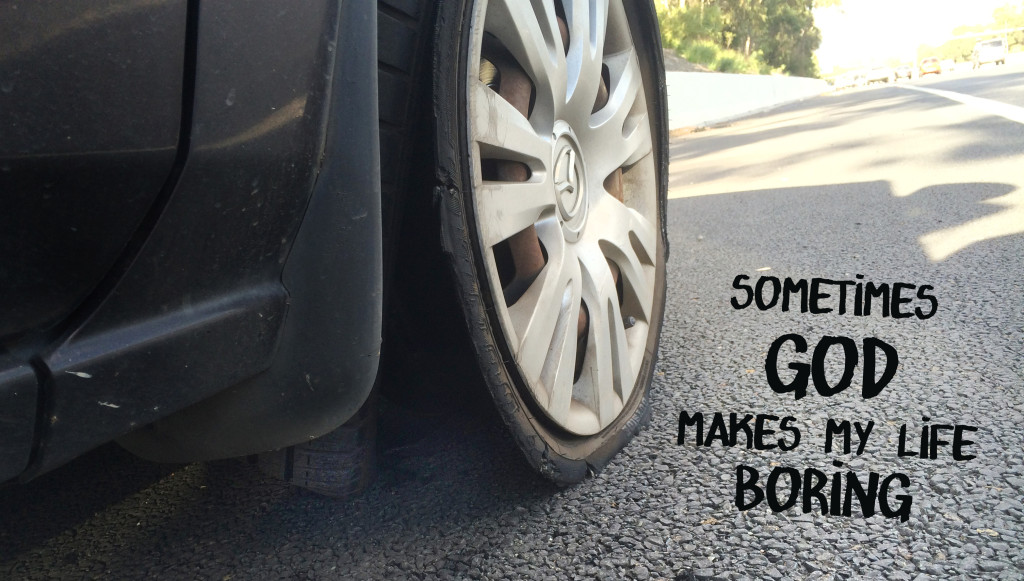
 The van veered off to try to avoid me and crashed into the short concrete wall separating the freeway, this cause a pile up of cars behind it as they all tried to screech to a holt. Meanwhile, the car behind me still hadn’t stopped and pushed my car into a spin. I was terrified and I can remember screaming and thinking that I was truly going to die and how horrible that would be. Several other cars then plowed into mine as I spun, pushing me further across the freeway and into the lane of an oncoming truck. The last thing I heard was the deafening hiss of the truck’s airbreaks as the driver desperately tried to avoid me.
The van veered off to try to avoid me and crashed into the short concrete wall separating the freeway, this cause a pile up of cars behind it as they all tried to screech to a holt. Meanwhile, the car behind me still hadn’t stopped and pushed my car into a spin. I was terrified and I can remember screaming and thinking that I was truly going to die and how horrible that would be. Several other cars then plowed into mine as I spun, pushing me further across the freeway and into the lane of an oncoming truck. The last thing I heard was the deafening hiss of the truck’s airbreaks as the driver desperately tried to avoid me.